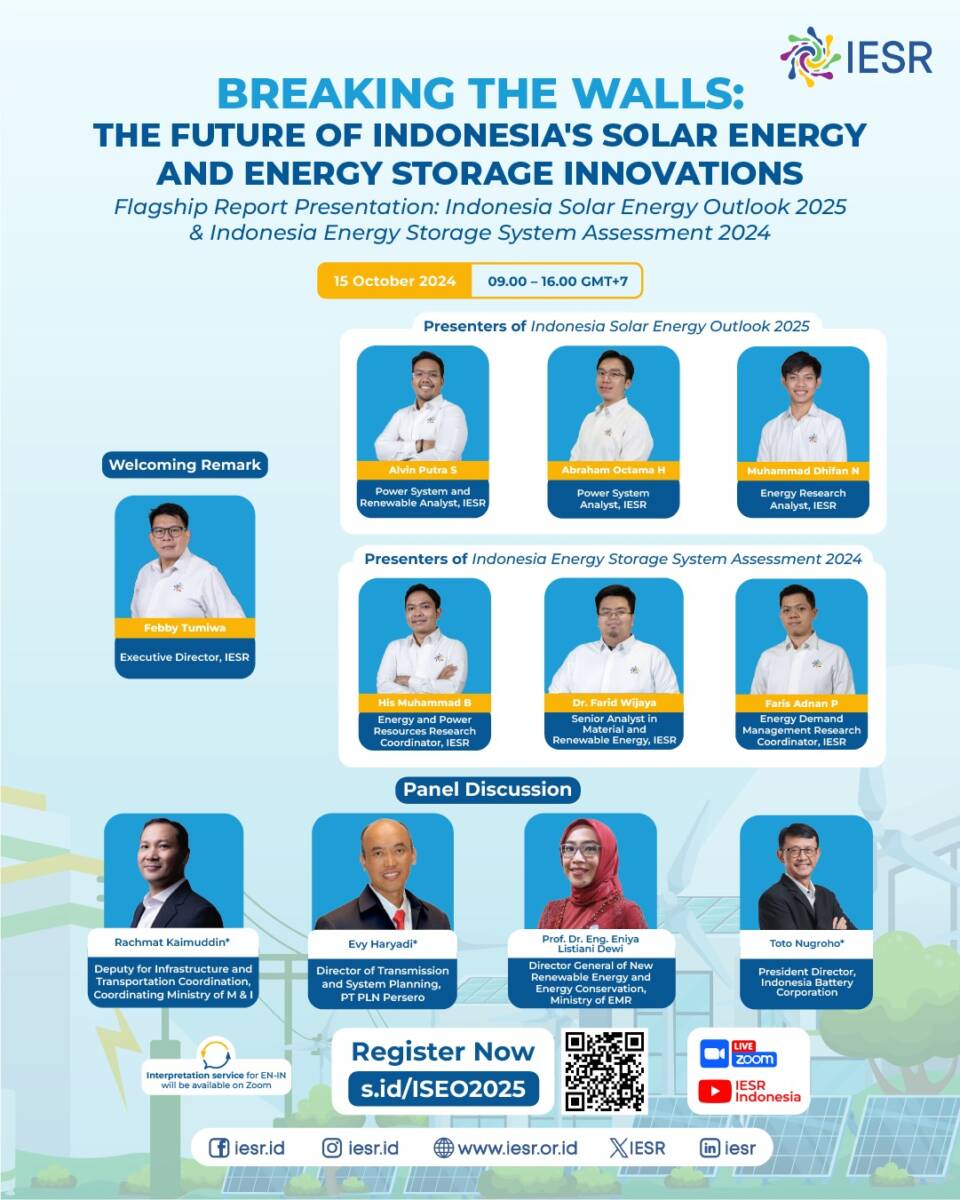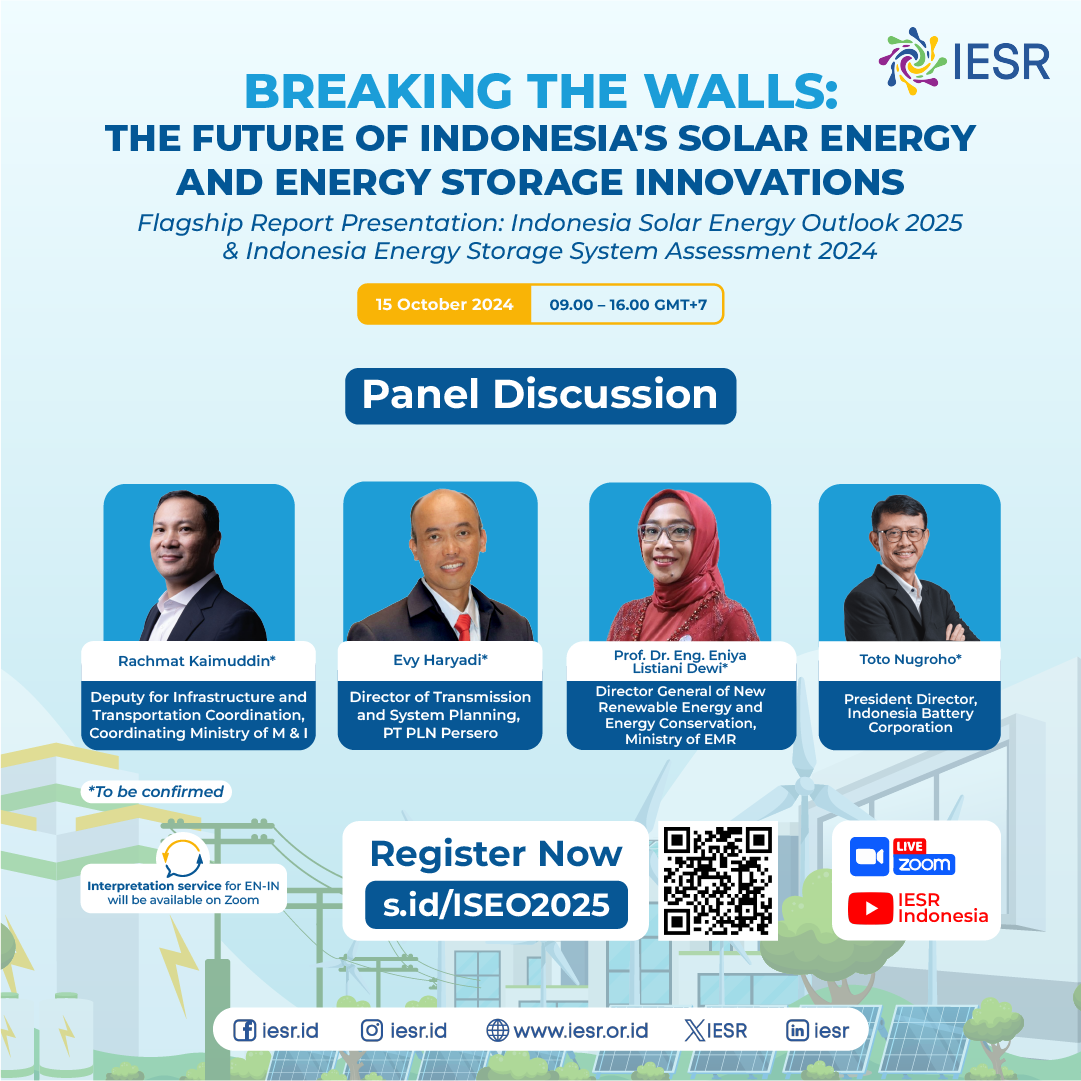
Breaking the Walls: The Future of Indonesia’s Solar Energy and Energy Storage Innovations
Background
As the global energy transition accelerated, Indonesia is at a critical juncture in its efforts to redefine its energy landscape. In order to address the walls in energy security while also concerning the net zero emission target, find a sustainable energy solution that addresses the expanding population, rapid industrialization, and increasing energy demands. Innovative solar energy technologies, in conjunction with energy storage systems, offer a transformative opportunity to reduce dependence on fossil fuels, improve energy security, and generate new economic opportunities.
As of 2023, solar energy was the primary source of renewable energy, accounting for 73% of the global energy capacity of 346 GW (Ember, 2024). This substantial figure significantly impacts Indonesia’s energy planning, leading to the integration of this form of energy into regulation, power sector planning, and the strategy for achieving net-zero emissions. Indonesia, with a technical potential of 3,294 GWp (MEMR, 2022) and the potential to reach almost 20,000 GWp depending on land availability and suitability (IESR, 2021), stands to gain significant advantages from extensive implementation of solar energy technology for utility-scale to small-scale facilities, including those located on the ground, in water bodies, and on rooftops.
However, several challenges remain to these renewable energy innovations, including the narrative of intermittency, regulatory barriers, technological advancement, and financial constraints. Despite the progress of solar energy development in Indonesia, which only accounts for 664.5 MW of capacity per June 2024, effective resolution of these challenges necessitates more cooperative endeavors involving the governmental and business sectors, academia, and civil society in Indonesia to reduce the interdependence of our energy system from fossil fuels.
This event, termed “Breaking the Walls: Indonesia’s Future on Solar Energy and Storage Innovations,” seeks to examine the present condition of solar energy in Indonesia, analyze the most recent advancements in energy storage systems, and propose feasible strategies for expanding the use of solar power. This will be done through the presentation of the flagship report on Indonesia Solar Energy Outlook 2025 and Indonesia Energy Storage System Assessment, which the Institute for Essential Services Reform has been diligently developing for the past year. Through this forum, we will also highlight the critical role that technology, policy, and investment play in driving Indonesia’s renewable energy future, which will be presented by change makers that already implement these innovative efforts.
Objective
The event will feature expert presentations, panel discussions, and networking opportunities, designed to facilitate knowledge exchange and foster collaboration among key stakeholders. More specific, the event will contribute to;
- Presenting the current state of Indonesia’s Solar Energy and Energy Storage System landscape.
- Shaping future strategies and policies to accelerate Indonesia’s solar energy growth and energy storage adoption.
- Positioning Indonesia’s opportunities to become a leader in the development of its abundant renewable energy in Southeast Asia.
Launching Presentation ESS 2025
Launching-Presentation-ESS-2025Trina Mas Agra Indonesia – PV Modul Technology Introduction
Trina-Mas-Agra-Indonesia-PV-Modul-Technology-IntroductionSUN Energy – Shaping Future Energy with Integrated Solar
SUN-Energy-Shaping-Future-Energy-with-Integrated-SolarSEI – Solar & Battery Technology and Aplication
SEI-Solar-Battery-Technology-and-Aplication
Speakers
-
Toto Nugroho - President Director - Indonesia Battery Corporation
-
Fabby Tumiwa - Chief Executive Officer (CEO) - IESR
-
Rachmat Kaimuddin - Deputy Coordinating Ministry for Infrastructure and Regional Development
-
Prof. Dr. Eng. Eniya Listiani Dewi - Director General of New Renewable Energy and Energy Conservation - Ministry of Energy and Mineral Resources
-
Evy Haryadi - Direktur Transmisi dan Perencanaan Sistem PLN

